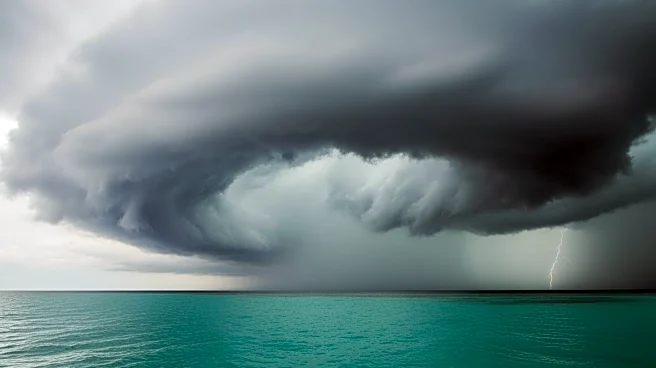What's Happening?
Tropical Storm Melissa has emerged in the Caribbean Sea, marking a significant development in the Atlantic hurricane season. The storm is currently positioned about 300 miles south of Haiti, with maximum
sustained winds of 50 mph. According to the National Hurricane Center, Melissa is expected to intensify into a hurricane by Saturday. The storm poses a serious threat to Hispaniola, with forecasts indicating potential for significant flooding and dangerous mudslides in the Dominican Republic and Haiti. A hurricane watch has been issued for parts of Haiti, while Jamaica is under a tropical storm watch. Although the storm's exact trajectory remains uncertain, there is a low chance of direct impact on the mainland United States, with Puerto Rico more likely to experience rainfall from Melissa.
Why It's Important?
The formation of Tropical Storm Melissa underscores the ongoing challenges posed by the Atlantic hurricane season, particularly as climate change contributes to warmer sea temperatures that can fuel storm intensification. The potential for severe weather in Hispaniola highlights the vulnerability of regions with mountainous terrain to flash flooding and mudslides. The storm's development could have broader implications for disaster preparedness and response in the Caribbean, as well as potential economic impacts on affected areas. Additionally, the possibility of rough surf and rip currents along the U.S. East Coast next week could affect coastal communities and industries reliant on tourism.
What's Next?
As Tropical Storm Melissa continues to develop, meteorologists will closely monitor its path and strength. The storm's trajectory could shift, potentially affecting Central America or Cuba if it does not take the anticipated northward turn. Stakeholders in the Caribbean and the U.S. will need to prepare for varying scenarios, including potential evacuation orders and emergency response measures. The National Hurricane Center will provide updates as the storm's characteristics become clearer, guiding local governments and residents in their preparations.
Beyond the Headlines
The intensification of Tropical Storm Melissa may serve as a case study in the effects of climate change on hurricane formation and behavior. The storm's development over unusually warm Caribbean waters highlights the increasing frequency of rapid storm intensification, a phenomenon linked to global warming. This could prompt further research into climate adaptation strategies and the need for enhanced infrastructure resilience in hurricane-prone regions.









